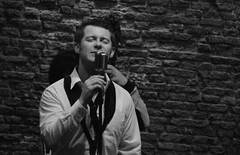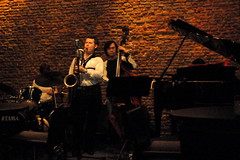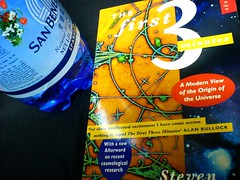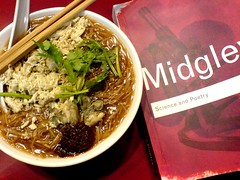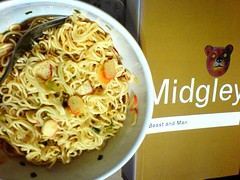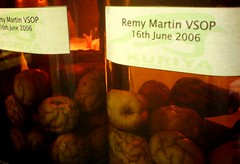Everything Changes But You: Neuroplasticity and Christian Belief, Klee and De Sté
Heraclitus' toe-dipping exercise might have encompassed the change of status that comes with marriage, the change in frequency of nights out that accompanies each new baby, the change of jobs that comes with being bored with the old one, the change of singer/musician for the night on account of the usual one being indisposed, the change in how we have our way with cocktails and chocolates...following the Moskva down to Gorky Park on an August summer night...
But the old Greek had nothing on neuroplasticity. If the hypotheses of neuroplasticity are indeed accurate, then the previously entrenched idea of the immutability of the brain (and hence of thoughts, personality, traits, talents etc) must itself be overhauled. Far from being hardwired from birth or childhood, or enslaved by genes, the adult brain can and does change physiologically according to experience, thinking and education.
Newtonian physics (as distinguished from the theories of the apple-pelted Newton himself) has been accused of promoting the tyranny of determinism in various fields including biology and neuroscience. As the discovery of quantum physics replaced belief in deterministic systems with probabilistic systems, it is also said that epiphenomenalism, the idea that consciousness has no casual impact on the brain but that the neurons fire first before the mind experiences decision-making, has now been replaced by neuroplasticity.
The first time I tried to explain the concept of neuroplasticity, we were at Bar Stop, waiting for good mates to arrive and also Tim O'Dwyer and his saxophone in place of Anne Weerapass. A hopefully more lucid explanation follows.
Observing his father's recovery from a massive stroke, Paul Bach-y-Rita realised that our brains are more flexible than localisation would have us believe. His father recovered so well that he returned to lecturing at college, remarried, went hiking and travelling and enjoyed a fully energetic life until his death (from a heart attack while climbing a mountain). The autopsy revealed that his father had in fact been doing all this on 3% of the nerves that run from the cerebral cortex to the spine; the rest had been destroyed in the stroke. Where neurologists used to say that the visual cortex in our occipital lobe processes vision and the auditory cortex in our temporal lobe processes hearing, Paul showed that these areas are plastic and capable of processing a variety of input not just visual or auditory as the case may be. The blind can, for example, learn to "see" with their tongues and ferrets who had their retina fibres wired to their auditory pathways learned to "see" with their auditory cortex (Discover, 2003).
(But I guess while this sort of "see"-ing approximates the product of input from our retinas in the sense of perception and interpretation of light, it is unlikely to result in the exact same product that is derived from the retinas being connected by optic nerves to our visual cortex. I wonder then, when one sees with the tongue, if colours and shapes are interpreted as distinctive tastes. Anyway, whew. So it's not too weird that music and the sounds of certain instruments and voices has always been to me sometimes synonymous with certain shapes and lines of varying widths and colours, and also certain textures and tastes. Maybe there's a living to be made translating music to pleasing visuals to the tune of Tom Hingston, who did awesome cover work for one of my favourite bands, Massive Attack. Maybe such cover work can even be multimedia - encompassing texture and taste.)
Later on, Michael Merzenich discovered competitive plasticity. The conventional view was that the brain was only plastic for a period of time (the critical period) during childhood after which it is too rigid to change its structure on a large scale, hence the Mozart Effect/Montessori/enrichment class crush so often observed amongst the progeny of parents who only want "the best" for them. Competitive plasticity suggests that adults have difficulty learning another language, musical instrument or skill not because their brains have already been hardwired, but because cerebral real estate is competitive and any bit left vacant is quickly taken over for other uses. So if two languages had been learned at the same time, then both would have shared in more or less equal parts, that bit of real estate.
Merzenich then started Posit Science - a company devoted to helping people ensure that occupancy levels continue to be high in their little plot of grey matter.
How to transfer occupancy in cerebral real estate? The Hebbian learning axiom that "neurons that fire together wire together" summarises the theory that "the persistence or repetition of a reverberatory activity tends to induce lasting cellular changes that add to its stability"; repetition helps neurons develop strong connections with one another when they are activated at the same moment in time, thereby leading to synaptic strength and a change in grey matter residency and therefore thought patterns and resultant behaviour.
This theory is the basis of programmes for children with learning disabilities in Arrowsmith School, and the Fast ForWord programme by Merzenich's other company, Scientific Learning.
If mere thinking or imagining, immaterial actions, leaves material traces, if each thought alters the physical brain, then it possible to sculpt our brains as we sculpt our bodies.
So what of belief then? When determinism was in, it was fashionable to advocate a God Spot, or God Gene, to explain why certain people believed in a higher power and others didn't; a gene which gives these types a predisposition to episodes interpreted by some as religious experiences. There were several detractors including one Carl Zimmer who dismissed such claims saying that, given the low explanatory power of VMAT2, it would have been more accurate for the author of The God Gene: How Faith Is Hardwired Into Our Genes, Dean Hamer, to have named his book "A Gene That Accounts for Less Than One Percent of the Variance Found in Scores on Psychological Questionnaires Designed to Measure a Factor Called Self-Transcendence, Which Can Signify Everything from Belonging to the Green Party to Believing in ESP, According to One Unpublished, Unreplicated Study".
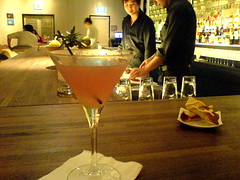
Scientific Study That Brain Activation Similar in Monks in Deep Meditation on Compassion and Friends Downing Cocktails at Klee Leads to Mixology Being Recognised As Official Religion
It is always good copy for the media to stir science up against what they term "religion" and sprinkle the word "controversial" liberally onto the mix. So who can resist pouncing on the theory of neuroplasticity as evidence that belief in God is nothing more than a mere rearrangement of synapse-firing without any basis in external reality, brought on no doubt by tyrannical repetition by relatives, friends and cultists.
Neurotheology (alas! Memories of Secondary 2 literature text horror, Aldous Huxley,'s Island!) purports to demonstrate that religious experience (and therefore the truth of religions) can be explained by cognitive neuroscience. Statisticians and fans of Freakonomics would quickly intone, correality (if any) does not necessarily mean causality.
Furthermore, neurotheologians mistakenly identify religion with specific experiences and feelings. Very few thoughtful Christians base their belief on some experience of a "mystical union with God" or transcendent rapture.
Plus, there is enough external evidence to prove the veracity of Christian truth claims. Oh but oooh, can we be sure that cognitive faculties are reliable enough to interprete that which we claim they interprete? In addition to the many obvious and common-sensical epistemological arguments, Alvin Plantinga calmly notes, in his usual fashion, that this sort of thinking is in fact itself subject to the rationality hiccups. (You had me at "vituperation", Mr. Plantinga.)
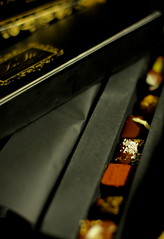
Scientists Report Need for Further Research on Whether Increased Ingestion of Cocoa Matter Aids in Neuroplastic Sanctification Process
Now that that's out of the way, what is of interest is how neuroplasticity, *if true*, interacts with the event Christians term "conversion" and the process known as "sanctifcation". Laterz.
BarStop
6 Devonshire Road
Singapore 239844
Tel: 6735 6614
Klee
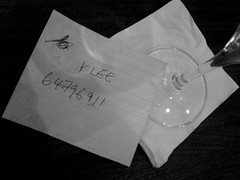
5B Portsdown Road #01-04
Singapore 139311
Tel: 6479 6911
No menu, no wine, no beer, no straight shots, no bar snacks, no website but check out their Facebook fan site. Eh, said the drinking buddy, how to survive like that?
The premise of the place is that Singapore is a market mature enough for "bespoke cocktails". Why splash cash on hair-on-chest drinks that have to be thrown down the back of your throat because they are the embodiment of such great foulness? The cocktails indeed score nicely on the alcohol percentage test but remain smooth with layered flavours that reveal themselves through the life of the drink or mouthful. Earnest and friendly (but not overly-chatty) mixologists happily explain each ingredient as they muddle fresh fruits, pour in measures of Smirnoff Black, Belvedere, Bombay Sapphire gin or fruit liquers or a bit of Bols blue (I got a bottle of this duty-free on the ferry to Amsterdam and we had great fun back at halls because it turned our tongues blue and lent itself to all sorts of corny coastal/sea-themed cocktails) for a China Blue. On offer, as far as the memory goes were strawberrytinis, grape-tinis, kiwitinis, grapefruit martinis, Earl Grey martinis, mojito sherbets (mango this week, but, said Wijaya, I found some blackberry sherbet in the supermarket so maybe blackberry next week) made with freshly squeezed lime juice muddled with sugar and fresh mint leaves, cosmo royal, secret garden, flirtinis (somewhat like a French martini? It's the Chambord layer at the bottom of the glass). They've also connected their ice machine to a Hyflux Reverse Osmosis Drinking Water System to produce pure distilled ice that is free from contaminants (kinda like NEWater, no?).
Anyway, only managed to sample 2.2 of the unwritten menu, fearing that I might need to take the wheel. Fortunately, designated driver was sober enough for me to warm the passenger seat.
Still, there was the organic enjoyment of watching drinks being prepared in the pit. Wijaya said their bottle of Pimms had been relak-ing one corner since opening day because it was difficult to make a good cocktail out of its contents. Wonder if we could do a sort of volatile compound test, the way food pairings are done in molecular gastronomy, to discover new mixes for cocktails with ingredients that share common odorants or other organoleptic qualities. To poshify our lab work, we could market it as "molecular mixology". Imagine: pineapple, blue cheese and white wine! Oyster and kiwi! Liver and Jasmine! A few months ago, I discovered, after accidentally leaving a punnet of strawberries in the car, that hot strawberries smelled like tomatoes. Hot strawberry juice instead of tomato juice in your Bloody Mary p'haps? The cocktail experimenting paws were twitching.
DeSté, by Stefano Deiuri
20 Upper Circular Road
#01-39/41
The Riverwalk
Singapore 058416
Tel: 6536 1556
Intriguing experiments with chocolates. Choices include crunchy exotic fruit salad (pineapple, mango, peach), Cartagena (passionfruit and fleu de sel-caramel), lemon-mint, black sesame and ginger-lime, olive oil (!), rock chocolate (pumped full of air for light, melt-in-the-mouth texture)... Interesting looking cakes too. Curiousity wants to ring its doorbell repeatedly then run straight to the kitchen through the opened door.
The Brain That Changes Itself, Norman Doidge
Written in an enthusiastic, repetitive, American telemarketeering, individuals-are-in-control-of-their-lives style. I suppose time and even more research will tell if claims within are true?
But the old Greek had nothing on neuroplasticity. If the hypotheses of neuroplasticity are indeed accurate, then the previously entrenched idea of the immutability of the brain (and hence of thoughts, personality, traits, talents etc) must itself be overhauled. Far from being hardwired from birth or childhood, or enslaved by genes, the adult brain can and does change physiologically according to experience, thinking and education.
Newtonian physics (as distinguished from the theories of the apple-pelted Newton himself) has been accused of promoting the tyranny of determinism in various fields including biology and neuroscience. As the discovery of quantum physics replaced belief in deterministic systems with probabilistic systems, it is also said that epiphenomenalism, the idea that consciousness has no casual impact on the brain but that the neurons fire first before the mind experiences decision-making, has now been replaced by neuroplasticity.
The first time I tried to explain the concept of neuroplasticity, we were at Bar Stop, waiting for good mates to arrive and also Tim O'Dwyer and his saxophone in place of Anne Weerapass. A hopefully more lucid explanation follows.
Observing his father's recovery from a massive stroke, Paul Bach-y-Rita realised that our brains are more flexible than localisation would have us believe. His father recovered so well that he returned to lecturing at college, remarried, went hiking and travelling and enjoyed a fully energetic life until his death (from a heart attack while climbing a mountain). The autopsy revealed that his father had in fact been doing all this on 3% of the nerves that run from the cerebral cortex to the spine; the rest had been destroyed in the stroke. Where neurologists used to say that the visual cortex in our occipital lobe processes vision and the auditory cortex in our temporal lobe processes hearing, Paul showed that these areas are plastic and capable of processing a variety of input not just visual or auditory as the case may be. The blind can, for example, learn to "see" with their tongues and ferrets who had their retina fibres wired to their auditory pathways learned to "see" with their auditory cortex (Discover, 2003).
(But I guess while this sort of "see"-ing approximates the product of input from our retinas in the sense of perception and interpretation of light, it is unlikely to result in the exact same product that is derived from the retinas being connected by optic nerves to our visual cortex. I wonder then, when one sees with the tongue, if colours and shapes are interpreted as distinctive tastes. Anyway, whew. So it's not too weird that music and the sounds of certain instruments and voices has always been to me sometimes synonymous with certain shapes and lines of varying widths and colours, and also certain textures and tastes. Maybe there's a living to be made translating music to pleasing visuals to the tune of Tom Hingston, who did awesome cover work for one of my favourite bands, Massive Attack. Maybe such cover work can even be multimedia - encompassing texture and taste.)
Later on, Michael Merzenich discovered competitive plasticity. The conventional view was that the brain was only plastic for a period of time (the critical period) during childhood after which it is too rigid to change its structure on a large scale, hence the Mozart Effect/Montessori/enrichment class crush so often observed amongst the progeny of parents who only want "the best" for them. Competitive plasticity suggests that adults have difficulty learning another language, musical instrument or skill not because their brains have already been hardwired, but because cerebral real estate is competitive and any bit left vacant is quickly taken over for other uses. So if two languages had been learned at the same time, then both would have shared in more or less equal parts, that bit of real estate.
Merzenich then started Posit Science - a company devoted to helping people ensure that occupancy levels continue to be high in their little plot of grey matter.
How to transfer occupancy in cerebral real estate? The Hebbian learning axiom that "neurons that fire together wire together" summarises the theory that "the persistence or repetition of a reverberatory activity tends to induce lasting cellular changes that add to its stability"; repetition helps neurons develop strong connections with one another when they are activated at the same moment in time, thereby leading to synaptic strength and a change in grey matter residency and therefore thought patterns and resultant behaviour.
This theory is the basis of programmes for children with learning disabilities in Arrowsmith School, and the Fast ForWord programme by Merzenich's other company, Scientific Learning.
If mere thinking or imagining, immaterial actions, leaves material traces, if each thought alters the physical brain, then it possible to sculpt our brains as we sculpt our bodies.
So what of belief then? When determinism was in, it was fashionable to advocate a God Spot, or God Gene, to explain why certain people believed in a higher power and others didn't; a gene which gives these types a predisposition to episodes interpreted by some as religious experiences. There were several detractors including one Carl Zimmer who dismissed such claims saying that, given the low explanatory power of VMAT2, it would have been more accurate for the author of The God Gene: How Faith Is Hardwired Into Our Genes, Dean Hamer, to have named his book "A Gene That Accounts for Less Than One Percent of the Variance Found in Scores on Psychological Questionnaires Designed to Measure a Factor Called Self-Transcendence, Which Can Signify Everything from Belonging to the Green Party to Believing in ESP, According to One Unpublished, Unreplicated Study".

Scientific Study That Brain Activation Similar in Monks in Deep Meditation on Compassion and Friends Downing Cocktails at Klee Leads to Mixology Being Recognised As Official Religion
Neurotheology (alas! Memories of Secondary 2 literature text horror, Aldous Huxley,'s Island!) purports to demonstrate that religious experience (and therefore the truth of religions) can be explained by cognitive neuroscience. Statisticians and fans of Freakonomics would quickly intone, correality (if any) does not necessarily mean causality.
Furthermore, neurotheologians mistakenly identify religion with specific experiences and feelings. Very few thoughtful Christians base their belief on some experience of a "mystical union with God" or transcendent rapture.
Plus, there is enough external evidence to prove the veracity of Christian truth claims. Oh but oooh, can we be sure that cognitive faculties are reliable enough to interprete that which we claim they interprete? In addition to the many obvious and common-sensical epistemological arguments, Alvin Plantinga calmly notes, in his usual fashion, that this sort of thinking is in fact itself subject to the rationality hiccups. (You had me at "vituperation", Mr. Plantinga.)

Scientists Report Need for Further Research on Whether Increased Ingestion of Cocoa Matter Aids in Neuroplastic Sanctification Process
BarStop
6 Devonshire Road
Singapore 239844
Tel: 6735 6614
Klee

5B Portsdown Road #01-04
Singapore 139311
Tel: 6479 6911
No menu, no wine, no beer, no straight shots, no bar snacks, no website but check out their Facebook fan site. Eh, said the drinking buddy, how to survive like that?
The premise of the place is that Singapore is a market mature enough for "bespoke cocktails". Why splash cash on hair-on-chest drinks that have to be thrown down the back of your throat because they are the embodiment of such great foulness? The cocktails indeed score nicely on the alcohol percentage test but remain smooth with layered flavours that reveal themselves through the life of the drink or mouthful. Earnest and friendly (but not overly-chatty) mixologists happily explain each ingredient as they muddle fresh fruits, pour in measures of Smirnoff Black, Belvedere, Bombay Sapphire gin or fruit liquers or a bit of Bols blue (I got a bottle of this duty-free on the ferry to Amsterdam and we had great fun back at halls because it turned our tongues blue and lent itself to all sorts of corny coastal/sea-themed cocktails) for a China Blue. On offer, as far as the memory goes were strawberrytinis, grape-tinis, kiwitinis, grapefruit martinis, Earl Grey martinis, mojito sherbets (mango this week, but, said Wijaya, I found some blackberry sherbet in the supermarket so maybe blackberry next week) made with freshly squeezed lime juice muddled with sugar and fresh mint leaves, cosmo royal, secret garden, flirtinis (somewhat like a French martini? It's the Chambord layer at the bottom of the glass). They've also connected their ice machine to a Hyflux Reverse Osmosis Drinking Water System to produce pure distilled ice that is free from contaminants (kinda like NEWater, no?).
Anyway, only managed to sample 2.2 of the unwritten menu, fearing that I might need to take the wheel. Fortunately, designated driver was sober enough for me to warm the passenger seat.
Still, there was the organic enjoyment of watching drinks being prepared in the pit. Wijaya said their bottle of Pimms had been relak-ing one corner since opening day because it was difficult to make a good cocktail out of its contents. Wonder if we could do a sort of volatile compound test, the way food pairings are done in molecular gastronomy, to discover new mixes for cocktails with ingredients that share common odorants or other organoleptic qualities. To poshify our lab work, we could market it as "molecular mixology". Imagine: pineapple, blue cheese and white wine! Oyster and kiwi! Liver and Jasmine! A few months ago, I discovered, after accidentally leaving a punnet of strawberries in the car, that hot strawberries smelled like tomatoes. Hot strawberry juice instead of tomato juice in your Bloody Mary p'haps? The cocktail experimenting paws were twitching.
DeSté, by Stefano Deiuri
20 Upper Circular Road
#01-39/41
The Riverwalk
Singapore 058416
Tel: 6536 1556
Intriguing experiments with chocolates. Choices include crunchy exotic fruit salad (pineapple, mango, peach), Cartagena (passionfruit and fleu de sel-caramel), lemon-mint, black sesame and ginger-lime, olive oil (!), rock chocolate (pumped full of air for light, melt-in-the-mouth texture)... Interesting looking cakes too. Curiousity wants to ring its doorbell repeatedly then run straight to the kitchen through the opened door.
The Brain That Changes Itself, Norman Doidge
Written in an enthusiastic, repetitive, American telemarketeering, individuals-are-in-control-of-their-lives style. I suppose time and even more research will tell if claims within are true?
Labels: All Given For Food: Chocolate, All Given For Food: Kitchen Experiments that apparently approximate "Molecular Gastronomy", Science-ish Schtick
